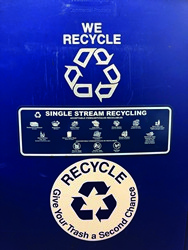We must realize that how we interact with the environment affects this planet. Just a few positive changes can make an impact and decrease our individual carbon footprint and help save the Earth.
Saving energy in the home is an easy first step that can be implemented. Simply turning off lights when leaving a room will reduce consumptions and limit carbon emissions. Utilizing windows for sunlight is an even better habit. During the day, instead of turning on lights to do homework, open the blinds and let the sunshine in. Also, as mindless as it is, unplug things when you aren’t using them.
Water is a basic but vanishing necessity. Numerous areas in our country suffer from a lack of water. Saving water is a major move towards being greener and it’s a fairly simple one. While brushing your teeth or washing your face, turn the tap off. By doing this, you could save water daily that equals gallons over time. Another way to conserve water is by taking shorter showers. Leave the singing and dance performance for your room and get in and out of the shower quickly.
Plastic is a major convenience factor but detrimental to the environment. Our ocean wildlife is screaming for change as they are choking on single-use plastics and nearing extinction. Plastic is used everywhere in our lives, but to combat the omnipresent killer there are non-plastic, reusable alternatives. Instead of plastic straws, there are paper, glass, steel, silicone, bamboo, and metal straws.
To avoid buying bottled water that is sold in plastic, opt for a reusable bottle and take advantage of the many water fountains and water bottle fountains on-campus. At home, without the convenience of a water fountain, Brita Filters are a green and cheaper alternative to access filtered water than buying bottled water.
Taylor Smith, a junior marketing student, added her input on the topic. Smith said, “I love my reusable water bottle. I got it on Amazon and it keeps your water cool and when you think about it, it will save me from using so many plastic water bottles this year.” She is a big advocate for going green.
Trees are sacrificed to produce paper products, another commodity that it abused. The education system is especially wasteful with paper. You know that student, the one who wastefully prints 40+ pages of scholarly articles, just to end up only needing a couple of lines or a few pages out of the stack.
Skip the printing and utilize your laptop or an on-campus computer to read those articles or assignments electronically. Downloading the document can allow you to highlight and take notes just like on actual paper.
Recycling is an obvious way to become greener, but not a completely effective solution. Many times, the items placed in recycling bins end up in landfills and the ocean because of fraudulent or inefficient processes. However, we have to continue to strive to recycle and support the regulatory agencies that provide governance to improve the system.
So, if you have to print that scholarly article, buy that bottled water, or use that plastic straw, at least recycle them. Utilize the various recycle bins scattered around campus and provided in on-campus housing.
Carpooling is a great way to use fewer natural resources and limit exhaust emissions. Instead of each of your housemates driving their own car to campus, combine your schedules and ride together. This not only saves gas and money but helps with the campus parking issue. If more commuters carpool, there will be more parking spots available.
A vegan lifestyle is not just about saving animals, but also about saving the planet. Shannon Harris, a junior marine and environmental biology and policy student who is also a student ambassador for the Sustainability Advisory Committee, said, “I go green in my everyday life by making choices that will reduce my carbon footprint. The most impactful way I do so is through a plant-based vegan diet. By going vegan, you can cut your carbon footprint in half, due to all of the land, resources, and emissions required to produce animals and animal products for food.”
Chris Hirschler, Chair and Associate Professor for the Department of Health and Physical Education, encourages a vegan diet, which he has followed for nearly 20 years. Hirschler said, “Gourmet Dining is making it easier to eat a low carbon footprint diet. They have added more plant-based options. Since what you eat has a huge impact on your carbon footprint – more than the vehicle you drive – this is an important improvement.”
Change is a scary subject within our society but is necessary to save the planet. Harris added, “Changing something like your diet or removing single-use plastics that challenge your convenience, seems like a daunting task at first. The more aware students become about their actual impact on this earth, along with education and accessibility to the alternatives, the easier these changes are to make” A greener Earth is within reach as long as we are willing to make changes to our lifestyles.
PHOTO TAKEN by Cassandra Capozzi-Smith



